Foreign News
Indian politician Baba Siddique shot dead in Mumbai
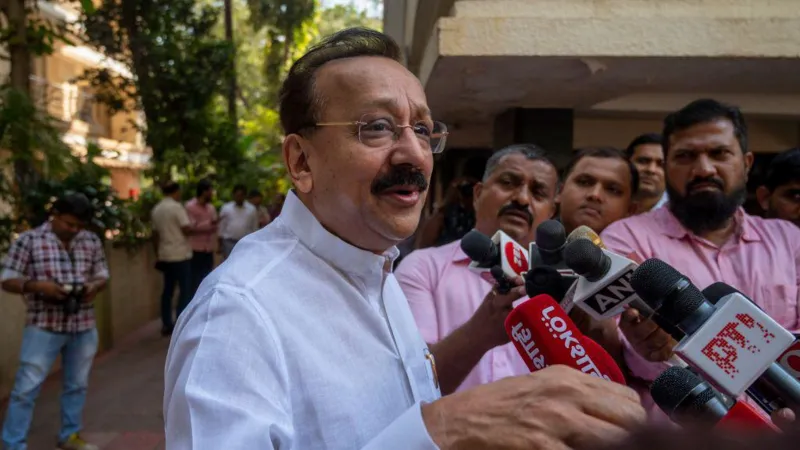
An Indian politician has been shot dead in the commercial capital, Mumbai.
Gunmen opened fire on Baba Siddique, 66, near the office of his son, who is also a politician, according to local media reports.
Two people have been arrested in connection with the killing.
Siddique, a former local minister, was a senior figure in the politics of Maharashtra state, which is expected to hold legislative polls next month.
In February he defected from Congress, India’s main opposition party and joined the unrelated regional National Congress Party (NCP), which is part of the governing coalition of the BJP.
Maharashtra’s deputy chief minister Ajit Pawar, from the same party as Siddique, said he was shocked by the “cowardly attack”.
Siddique was known for lavish parties and for close ties to Bollywood superstars.
The shooting happened with high security in place due to a major Hindu festival in the city.
Opposition parties have criticised the government, saying there was a major lapse in security. The state government has promised a thorough inquiry.
Though two suspects have been taken into custody, the motive is not clear. Police are searching for a third suspect. Some Indian media report the suspects have said they were from a gang run by notorious criminal Lawrence Bishnoi.
Bishnoi is currently serving a jail sentence for his involvement in several high-profile murder cases, including the killing of the Indian rapper Sidhu Moose Wala in 2022.
The shooting came weeks after Siddique’s security detail was upgraded following death threats.
[BBC]
Foreign News
Dozens killed in car rampage through Chinese stadium

At least 35 people have been killed in a car attack in southern China, believed to be the deadliest known act of public violence in the country in decades.
Police say a man crashed his car into a stadium in Zhuhai on Monday where he ran down groups of people exercising on the sports track.
The “serious and vicious attack” also injured 45 people – among them elderly and children, local media report.
Police say the 62-year-old driver, identified as a Mr Fan, appeared to have acted out of unhappiness over a divorce settlement.
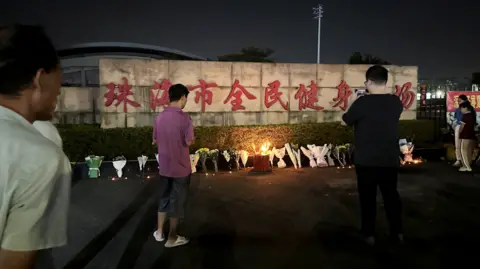
He was arrested as he tried to flee the Zhuhai Sports Center and is in a coma due to self-inflicted wounds, police said in a statement.
The incident has sparked a national outcry in China, where President Xi Jinping vowed “severe punishment” for the perpetrator, and called for “all-out efforts” to treat the injured.
Details of those who were killed have not been disclosed by authorities yet, but mourners and members of the public had begun laying flowers and other tributes outside the stadium on Tuesday.
The venue – featuring a running track loop – had been a popular exercise ground for locals. Witnesses told Chinese media it appeared Mr Fan had deliberately run people down.
One man named Mr Chen told Caixin news magazine he and his walking group had just completed a lap of the stadium when a car charged towards them at high speed, “knocking down many people”.
Another person at the scene told Caixin: “It drove in a loop and people were hurt in all areas of the running track.”
According to local police, who released a statement on Tuesday, they said their initial investigations suggested Mr Fan’s actions were triggered by a property dispute following his divorce. He is still in a coma and so has not been questioned, police said.
The attack may be the deadliest act of random public violence in China in recent decades. A number have been reported this year including a mass stabbing and firearms attack in Shandong in February which killed at least 21 people. That incident was heavily censored by Chinese authorities.
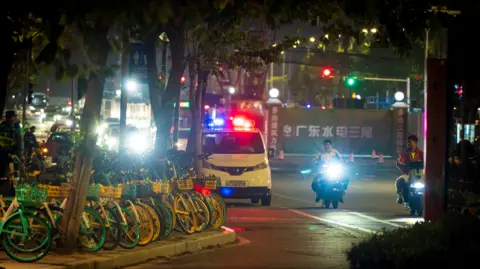
Reports of Monday’s attack were already being restricted online on Tuesday – with several videos taken by witnesses at the scene removed from Chinese social media platforms.
But some footage still circulating online showed dozens of people lying on the ground and being attended to by paramedics and bystanders.
In China it is common for censors to quickly take down social media videos which are linked to high-profile incidences of crime.
BBC journalists reporting from the stadium at Zhuhai on Tuesday were also harassed and told to stop filming.
China has seen a spate of violent attacks on members of the public in recent months that have been reported in local media to varying degrees.
In October, a knife attack at a top school in Beijing injured five people, while in September, a man went on astabbing spree at a supermarket in Shanghai, killing three people and injuring several others.
Also in September, a 10 year old Japanese student died a day after he was stabbed near his school in southern China.
Following Monday’s car attack, Japan’s embassy warned its nationals living in the country to avoid speaking Japanese loudly in public.
The incident in Zhuhai has also taken place during heightened security in the city, which is hosting a major military airshow this week. The attack on Monday night took place 40km (24 miles) from where the high-profile Airshow China kicked off on Tuesday.
China is showcasing its newest warplanes and attack drones at the show, which top Russian defence official and former defence minister Sergei Shoigu is expected to attend.
Several entrances and exits to the sports centre were closed during the airshow to facilitate “control”, the centre’s management said on Tuesday.
[BBC]
Foreign News
COP29 opens in Azerbaijan for talks centred on climate funding

The annual United Nations climate summit has started in Azerbaijan, with countries readying for tough talks on finance and trade, following a year of weather disasters that have emboldened developing countries in their demands for more funds.
Starting Monday, delegates from nearly 200 countries will be at the two-week COP29 forum in the capital city of Baku for talks being held under the long shadow cast by the re-election of Donald Trump, who has threatened to roll back the United States’s carbon-cutting commitments
n his opening speech, UN climate chief Simon Stiell said that world leaders must show that global cooperation “is not down for the count”.
“Here in Baku, we must agree a new global climate finance goal. If at least two thirds of the world’s nations cannot afford to cut emissions quickly, then every nation pays a brutal price,” he warned.
Stiell also appealed for an “ambitious” new goal on providing climate funding to the world’s poorer nations, saying: “Let’s dispense with any idea that climate finance is charity.”
In welcoming delegates, Azerbaijan’s Ecology Minister Mukhtar Babayev, who also serves as COP29 president, declared that “climate change is already here”.
“COP29 is the unmissable moment to chart a new path forward for everyone.”
The COP29 talks open amid new warnings that 2024 is on track to break temperature records, adding urgency to a fractious debate over climate funding as poorer countries seek an increase in the $100bn-a-year target at the forum.
In an interview with Al Jazeera, Damilola Ogunbiyi, UN Special Representative on Sustainable Energy, said that one of her “key expectations is on the role of climate finance”.
“We have a record-breaking year of investments in clean renewable energy. However, only 15 percent of that goes to the global south,” she said.
Trump’s return also looms over the discussions, with fears that an imminent US departure from the landmark Paris Agreement to limit global warming could mean less ambition around the negotiating table.
“We cannot afford to let the momentum for global action on climate change be derailed,” said Ralph Regenvanu, Vanuatu’s special envoy for climate change and environment. “This is a shared problem that will not solve itself without international cooperation, and we will continue to make that case to the incoming president of one of the world’s largest polluters.”
Outgoing US President Joe Biden is staying away from the talks, as are many leaders who have traditionally appeared early in COP talks to lend weight to the proceedings. German Chancellor Olaf Scholz, who is fighting a political crisis after the collapse of his ruling coalition, has also cancelled his trip to Baku.
Just a handful of leaders from the Group of 20, whose countries account for nearly 80 percent of global emissions, are attending.
Afghanistan will however be sending a delegation for the first time since the Taliban took power. They are expected to have an observer status.
Diplomats have insisted that the absences, and Trump’s win, will not detract from the serious work at hand, particularly agreeing on a new figure for climate funding to developing countries.
Host Azerbaijan will be tasked with keeping countries focused on agreeing to a new global finance target deal to replace the current $100bn pledge expiring this year. How much will be on offer, who will pay, and who can access the funds are some of the major points of contention.
“It’s hard. It involves money. When it comes to money, everybody shows their true colours,” Adonia Ayebare, the Ugandan chair of a bloc that groups more than 100 mostly developing countries and China, told the AFP news agency.
Ayebare brushed aside the potential consequences of a US withdrawal, noting that Trump already took Washington out of the Paris Agreement during his first term.
The talks also come with the latest warnings that the world is far off track to meet the goals of the Paris Agreement.
The climate deal commits to keep warming below 2C (3.6F) compared with pre-industrial levels, preferably below 1.5C (2.7F). But the world is on track to top that level in 2024, according to the European Union climate monitor.
Earlier this year, the UN warned the world is on track for a catastrophic 3.1C (5.58F) of warming this century based on current actions.
[Aljazeera]
Foreign News
New Zealand PM says sorry for ‘horrific’ care home abuse

New Zealand’s Prime Minister Christopher Luxon has formally apologised to victims of abuse in care homes, following an inquiry into one of the country’s biggest abuse scandals.
The historic apology, delivered in parliament, comes after a report found that 200,000 children and vulnerable adults had suffered abuse while in state and faith-based care between 1950 and 2019.
Many of them included people from the Māori and Pacific communities and those with mental or physical disabilities.
The government has since promised to reform the care system.
“I make this apology to all survivors on behalf of my own and previous governments,” said Luxon on Tuesday. “It was horrific. It was heartbreaking. It was wrong. And it should never have happened,” he added. “For many of you it changed the course of your life, and for that, the government must take responsibility.”
The inquiry, which Luxon described as the largest and most complex public inquiry ever held in New Zealand, took six years to complete and included interviews with more than 2,300 survivors of abuse in state and faith-based care institutions.
The ensuing report documented a wide range of abuses including rape, sterilisation, and forced labour.
It found that faith-based institutions often had higher rates of sexual abuse than state care; and civil and faith leaders fought to cover up abuse by moving abusers to other locations and denying culpability, with many victims dying before seeing justice.
The findings were seen as vindication for those who found themselves facing down powerful officialdom, the state, and religious institutions – and often struggling to be believed.
Some survivors and advocates arrived in parliament Tuesday to hear the prime minister’s apology, while hundreds of others tuned in through livestreams across the country. Luxon had earlier faced criticism for delivering the apology in parliament, as that meant many survivors could not hear from the prime minister directly.
Survivors have argued that Luxon’s apology rings hollow unless it is accompanied with proper plans for restitution.
“The effects of that trauma came through later on in life,” Tupua Urlich, a Māori survivor who had given his testimony of abuse to the inquiry, told the BBC’s Newsday programme. “It’s not just the physical abuse, it was the disconnection from my family, from my culture.”
“Justice? No, not yet… These words are nothing unless they’re followed by action, and the right kind of action that is informed by survivors.
“The government have proven that alone they’re not trusted, nor capable, of providing the sort of change and service that we need.”
Details on a restitution scheme are not expected until early next year.
Luxon said Tuesday that while the government works on a new financial redress mechanism for survivors, it would pump an additional NZ$32m ($19m, £15m) into its current system.
The inquiry had made over 100 recommendations, including public apologies from New Zealand authorities and religious leaders, as well as legislation mandating suspected abuse to be reported.
Luxon said the government has either completed or is in the process of working on 28 of these recommendations, but did not give specific detail.
A bill aimed at better protecting children in care had its first reading in parliament on Tuesday, after Luxon delivered the apology. The bill proposes, among other things, a ban on strip searches and greater restrictions on people working with young children.
Luxon also announced a National Remembrance Day to be held on 12 November next year to mark the anniversary of Tuesday’s apology.
“It is on all of us to do all we can to ensure that abuse that should never have been accepted, no longer occurs,” he said.
[BBC]
-
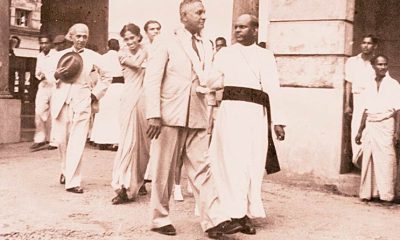
 Features4 days ago
Features4 days agoWhen Sir John Kotelawala visited St. Joseph’s College
-

 News4 days ago
News4 days agoSL will not be able to join BRICS right now but membership of its NDB bank okayed
-

 Sports4 days ago
Sports4 days agoPathum Nissanka; the ace up Sri Lanka’s sleeve
-

 Features4 days ago
Features4 days agoThe Assassination of Mr Bandaranaike
-

 News2 days ago
News2 days agoHarin drags Messi into poll mess
-

 Features1 day ago
Features1 day agoAdani’s ‘Power’ in Sri Lanka
-
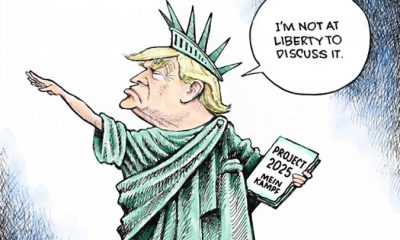
 Features4 days ago
Features4 days agoAmerica stands by its Man!
-
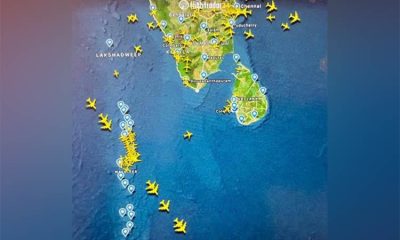
 Opinion3 days ago
Opinion3 days agoSri Lanka’s missed opportunities











